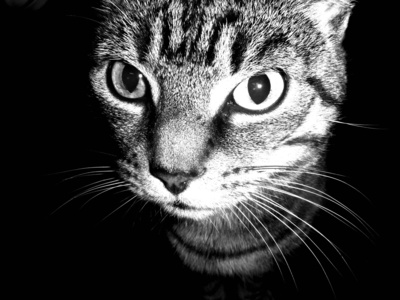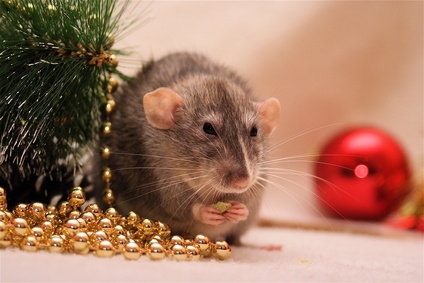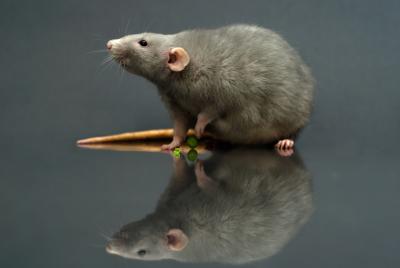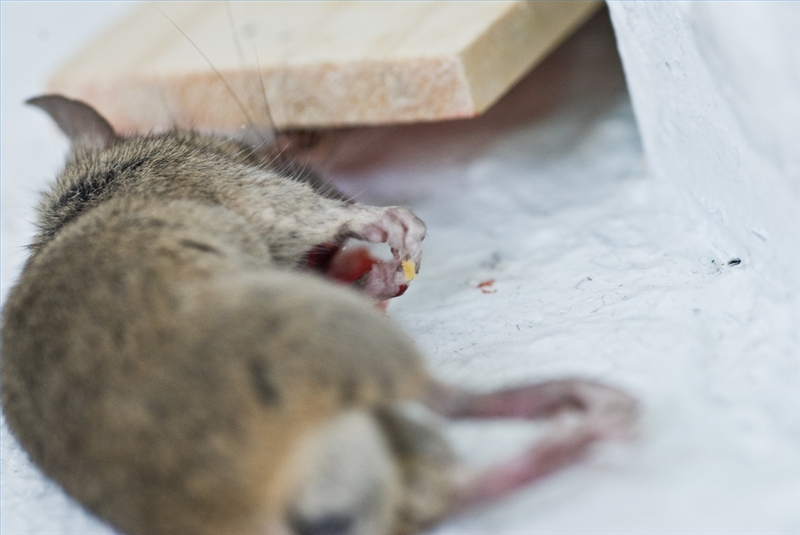
The Effects of Rat Poison on Cats. If you have a rodent problem, you may be tempted to purchase commercial products designed to kill rats. Unfortunately, many of these products are toxic to cats as well. If you suspect that your cat has ingested rat poison, contact your veterinarian or the ASPCA Animal Poison Control Center immediately. The ASPCA recommends that in certain cases--if your cat is having seizures, trouble breathing, or is unconscious--you should take your cat to a veterinarian without delay.

Rat poisons that contain aluminum phosphide, magnesium phosphide and zinc phosphide affect a cat's digestive tract. The reaction between the poison and gastric acid produces a gas that attacks red blood cells and small blood vessels in the liver, lungs, kidneys and heart, according to PetEducation.com. At high levels of toxicity, the gas produces a specific odor that you can smell, similar to rotten fish or garlic. Once a cat has ingested the poison, it may become lethargic, weak and refuse to eat. Vomiting, excess salivation, seizures, tremors and shock are also common. Some cats may develop abnormal skin sensitivity, low blood pressure and abnormal heart rhythms. Its skin may develop a bluish tinge. It may die.
Cholecalciferol is a vitamin D pesticide. Most cases of animal companion poisoning with cholecalciferol occur in dogs, but cats are susceptible. A cat that ingests cholecalciferol rat poisons suffers from a severe increase in calcium levels. This causes high blood pressure, bloody diarrhea, vomiting with blood in it, seizures, weakness, increased thirst, increased urination, depression and lack of appetite. Eventually, the cat will suffer from a mineralization of blood vessels, lungs, kidneys and the stomach wall, according to PetEducation.com. Kidney failure and death can occur.
Strychnine is a common pesticide for small pests such as rats and moles. According to PetEducation.com, strychnine causes the uncontrolled firing of nerves in poisoned cats. This causes the cat's muscles to move involuntarily, which can lead to the breakdown of muscle cells. This includes the muscles in the respiratory system, causing an inability to breathe correctly or at all. Signs of strychnine poisoning such as anxiety, labored breathing and seizures may occur. The cat's limbs may become stiff and rigid. Left untreated, strychnine poisoning is fatal for cats.
When a cat ingests a metaldehyde-based rat poison or an infected rat, its digestive tract absorbs the neurotoxicant. The toxin can then move through the bloodstream and reach the brain or liver. It decreases concentrations of important brain chemicals such as norepinephrine, serotonin and y-aminobutric acid, while increasing monoamine oxidase activity. The results of ingestion include tremors, seizures, dilated pupils, anxiety, loss of muscular control, skin sensitivity, rapid and involuntary eye movement, panting, an increase in body temperature and respiratory failure. PetEducation.com warns that a cat may survive the early stages of poisoning only to suffer from organ failure within three to five days. Death can result.
Bromethalin causes cells to swell and lose their function. According to PetEducation.com, this results in central nervous system dysfunctions such as paralysis of the cat's hindquarters and excess fluid in the brain. Consuming as little as 1 mg of bromethalin per pound of its body weight can lead to these problems. Signs of poisoning include seizures, hyperreflexia, tremors, excitability, vomiting, depression, refusing to eat, tremors, abdominal swelling and eventually death due to respiratory paralysis.
 How to Get Rid of Rodent Mites
How to Get Rid of Rodent Mites
How to
How to Get Rid of Rodent Mites
How to Get Rid of Rodent Mites
How to
 About North American Hawks
About North American Hawks
About North
About North American Hawks
About North American Hawks
About North
 The Effects of Moth Balls on Rodents
The Effects of Moth Balls on Rodents
T
The Effects of Moth Balls on Rodents
The Effects of Moth Balls on Rodents
T
 Good Bait to Catch a Mouse With a Rat Trap
Good Bait to Catch a Mouse With a Rat Trap
Good Bait to Catch a Mouse With a Rat Trap
Good Bait to Catch a Mouse With a Rat Trap
 Can Hamsters Eat Pumpkin?
Can Hamsters Eat Pumpkin?
Can Hamsters
Can Hamsters Eat Pumpkin?
Can Hamsters Eat Pumpkin?
Can Hamsters
Copyright © 2005-2016 Pet Information All Rights Reserved
Contact us: www162date@outlook.com